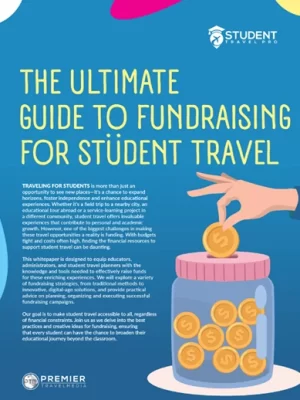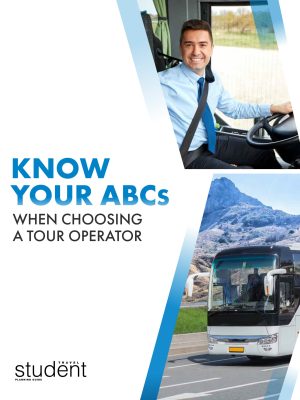How field trips foster teamwork, communication and leadership skills in students of all ages
Field trips have long been a staple of the educational experience, offering students a chance to step outside the classroom and into the real world. But these excursions are far more than just a break from routine–they play a crucial role in shaping students’ social and emotional development while encouraging experiential learning. In this article, we’ll explore how school field trips help foster essential life skills in students that extend far beyond academic learning in a classroom setting.
 The Role of Field Trips in Social Development
The Role of Field Trips in Social Development
Field trips provide unique opportunities for students’ social development that simply can’t be replicated in a classroom setting. When students are exposed to new learning environments, they’re challenged to interact with peers, teachers and community members in fresh new ways. This exposure to diverse social situations helps students develop adaptability and social awareness skills.
- Real-world experiences enhance social skills
- Interactions in unfamiliar settings boost adaptability
- Exposure to diverse environments broadens social perspectives
Enhancing Teamwork Skills
One of the most significant benefits of student field trips is their ability to cultivate teamwork skills among students. Many field trip activities are designed to require collaboration, pushing students to work together towards common goals.
For example, a nature hike might involve students working in teams to identify flora and fauna, or a museum visit could include group scavenger hunts. These activities not only make the experience more enjoyable but also teach valuable lessons in cooperation and collective problem-solving. When planning student field trips, these are things to keep in mind.

Improving Communication Skills
Communication takes on new dimensions during class field trips. Students are often required to interact with unfamiliar adults, ask questions and express their thoughts in novel situations. This practice in real-world communication is invaluable for developing confidence and articulation skills that they might not otherwise have the opportunity to develop.
Moreover, field trips often involve group discussions and reflections, allowing students to practice both speaking and listening skills. The varied environments of field trips also introduce students to different communication styles and cultural norms, which can help broaden their communication skills.
Developing Leadership Qualities
Educational field trips present numerous opportunities for students to step into leadership roles. Whether it’s leading a small group during an activity, taking charge of a project or simply helping to navigate a new place, these experiences allow students to discover and nurture their leadership potential.
 Emotional Growth Through New Experiences
Emotional Growth Through New Experiences
Stepping out of one’s comfort zone is a key aspect of emotional growth, and field trips provide the perfect setting for this. Field trips lend exposure to new environments, challenges and experiences that can help students develop emotional resilience and adaptability.
- New experiences promote emotional flexibility
- Overcoming challenges builds self-confidence
- Exposure to diverse settings fosters empathy and understanding
Field Trips and Social-Emotional Learning (SEL)
Social-emotional learning (SEL) has become a crucial focus in education, and field trips align perfectly with SEL goals. The Collaborative for Academic, Social, and Emotional Learning (CASEL) identifies five core competencies of SEL:
1. Self-awareness
2. Self-management
3. Social awareness
4. Relationship skills
5. Responsible decision-making
Field trips provide natural opportunities to develop all these competencies. For instance, a trip to a historical site might require students to manage their emotions when learning about difficult historical events (self-management), work together on a group project (relationship skills), and make decisions about how to present their findings (responsible decision-making).
For more field trip ideas and opportunities, keep reading from our 2025 Northeast Field Trip Guide.

Practical Tips for Educators and Parents
To maximize the social and emotional benefits of field trips, consider the following tips:
1. Plan pre-trip activities that set clear learning objectives and social expectations
2. Incorporate team-building exercises into the field trip itinerary
3. Assign roles or responsibilities to each student to encourage leadership
4. Schedule time for reflection and group discussion after the trip
5. Encourage students to journal about their experiences and emotions
6. Follow up with classroom activities that build on the field trip experiences
The Lasting Impact of Field Trips
The social and emotional skills students develop during field trips have a lasting impact on their lives. These experiences shape how students interact with their peers and others, approach challenges and help shape their world view. By providing opportunities for teamwork, communication and leadership in realistic settings, field trips contribute significantly to students’ overall development and future success.
As educators and parents, it’s crucial to recognize the value of field trips beyond their academic merits. By intentionally planning and leveraging these experiences, parents and educators can help students develop the social and emotional skills they need to thrive in school and beyond.
So, the next time you’re planning a field trip, remember that you’re not just organizing an educational or fun outing; you’re creating an opportunity for profound personal growth and development that will serve your students for the rest of their lives. Embrace the power of field trips to foster teamwork, communication and leadership skills, and watch as your students flourish socially and emotionally.
By Ashley Dale – Contributing Writer








